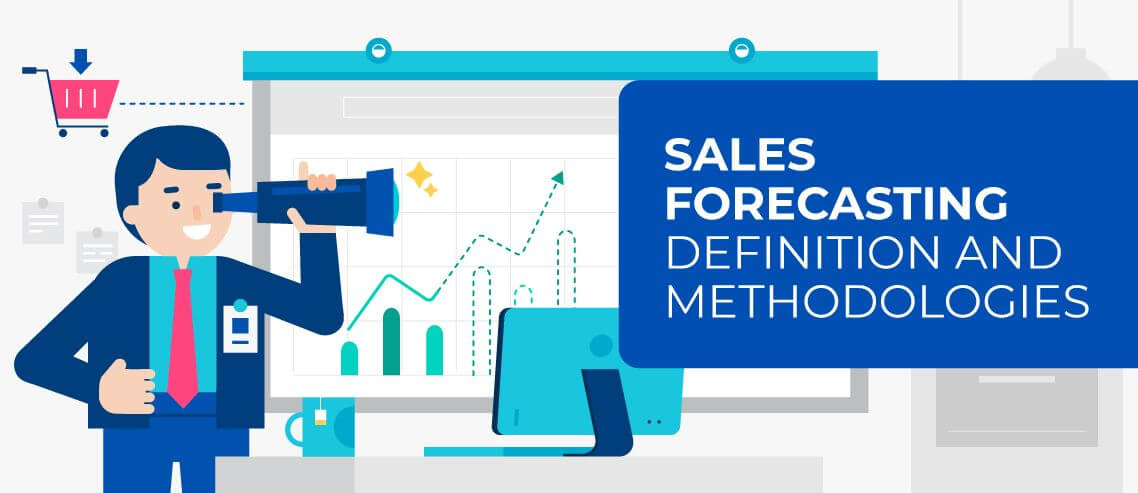30 Sales Training Programs and Techniques to Supercharge Performance in 2025

Contents
Sales training is an important part of any business. It can help employees learn new techniques, improve their performance, and even feel more confident. In order to stay ahead of the competition, it is crucial to invest in sales training programs that will help your team succeed.
In this post, we will discuss the different types of sales training programs available, such as sales role-play, and why they are important for your business. We also provide a few tips on how to make the most of your sales training.
What Is Sales Training?
Sales training is a process that helps salespeople learn the necessary skills to sell products or services to customers. This type of training can be provided by an employer, through online courses, or at physical locations.
In order to be effective, sales training must cover a wide range of topics, including product knowledge, customer service, communication, and negotiation. By teaching salespeople these essential skills, businesses will likely see an increase in sales and customer satisfaction.
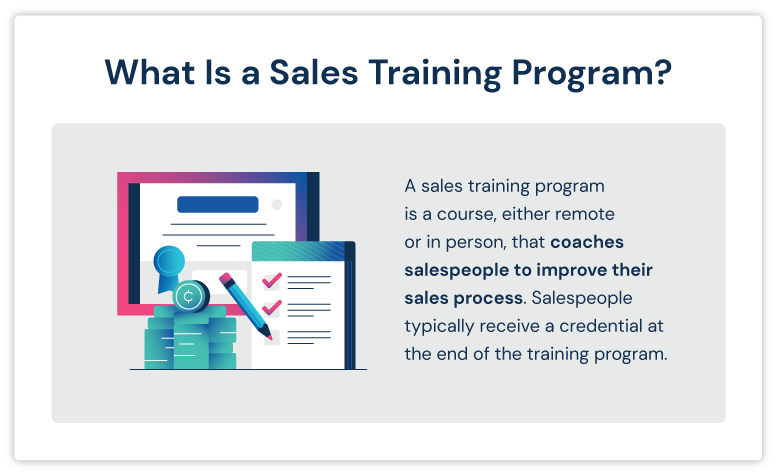
Why Is Sales Training Important?
Sales training can help your sales team understand your product inside and out, feel confident in any sales scenario, close knowledge gaps, and create a consistent and measurable approach to your sales process. Most importantly, however, it has a huge ROI.
Still on the fence? Check out these quick sales statistics that showcase the benefits of training your sales team:
- Ongoing training results in 50% more net sales per representative.
- Businesses that train their salespeople sell 57% more effectively than their competition.
- 65% of salespeople believe quality training helps improve their engagement.
- Every single dollar invested in sales training can generate as much as $4.53 in value. That’s an ROI of 353%!
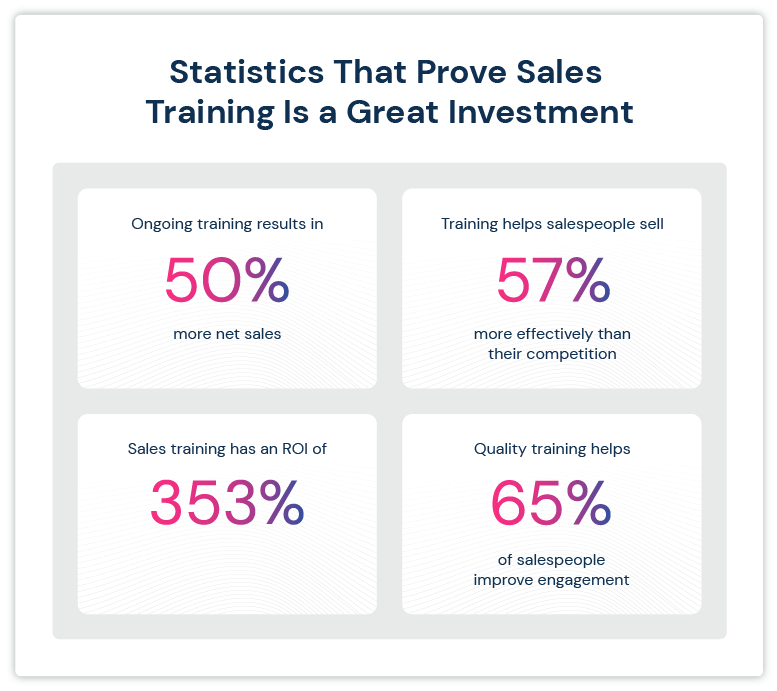
Types of Sales Training Programs
There are all kinds of different sales programs that can be generally broken down into four categories: customer journey, mindset, communication, and product knowledge.
- Customer journey training programs will focus on helping your sales team identify customers’ pain points, build robust sales funnels, and qualify leads in order to ensure they’re targeting the right market.
- Mindset sales training programs aim to instill the right attitude in your team members by helping them embrace rejection, build confidence, and stay motivated throughout the sales process.
- Communication sales training programs will equip your team with the skills they need to present their products or services confidently, close deals effectively, and actively listen to customers’ needs.
- Product knowledge sales training programs will ensure that your team is up to date on all the latest features and benefits of your products or services, and can answer any questions potential customers may have.
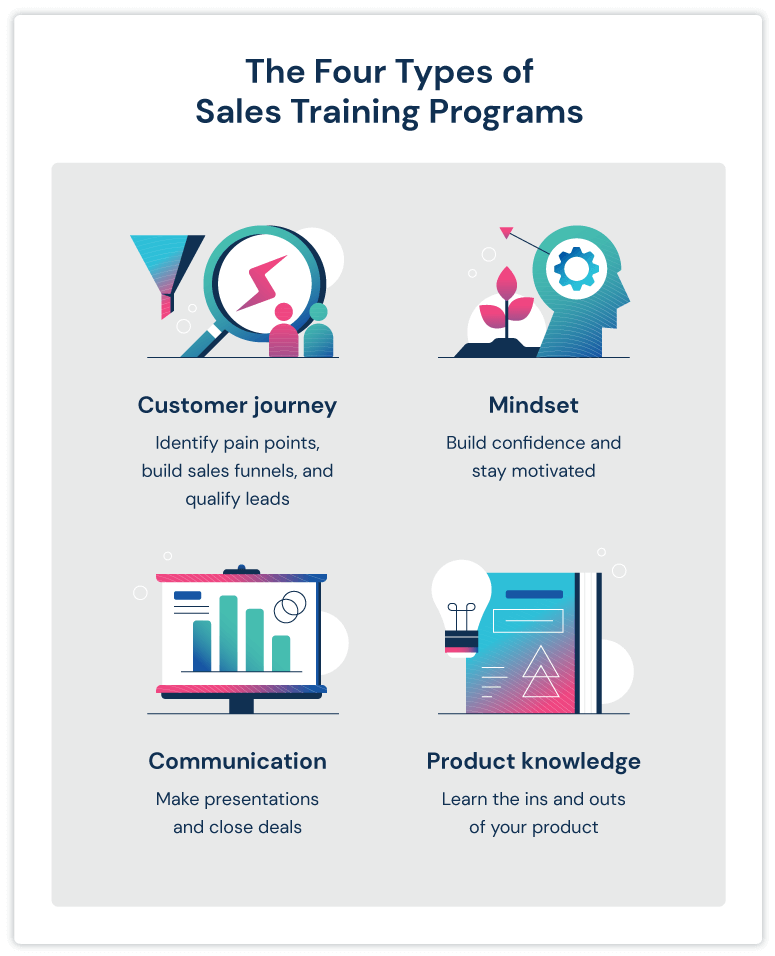
Sales Training Courses for Beginners
Sales training can be as easy or as difficult as required, but if you’re considering your team’s first-ever training courses, you should look at some of the programs listed below.
1. Introduction to Sales
This course offers 31 tutorials to help aspiring salespeople develop essential skills. Using real-world examples and script outlines, sales reps will learn the best way to navigate common sales situations. By the end of the course, salespeople should know how to identify their ideal customers, put together product demonstrations, and close more deals.
- Who It’s By: David Brownlee via GoSkills
- Location: Online
- Course Length: Estimated 15h 30m for all materials
- Course Focus: General sales skills
- Price: $29 per month, includes full suite of GoSkills courses
- Best For: Beginner salespeople
| Pros | Cons |
|
|
2. The Art of Sales: Mastering the Selling Process Specialization
More than anything, beginners need to learn the fundamentals.
The Art of Sales Specialization is a program geared toward entry-level salespeople, offering a range of courses covering the fundamentals that every good salesperson needs to know, from prospecting to pitching to closing deals.
- Who It’s By: Northwestern University via Coursera
- Location: Online
- Course Length: Six months
- Course Focus: General sales skills
- Price: $399 per year, includes other programs offered on Coursera Plus
- Best For: Beginner salespeople
| Pros | Cons |
|
|
3. Value Based Selling
Sometimes salespeople need to think outside of the box. Mercuri Global’s Value Based Selling program offers just that.
The program looks at a different type of sales methodology. Rather than focusing on a specific product, this methodology teaches salespeople how to sell value.
- Who It’s By: Mercuri Global
- Location: Online
- Course Length: 11 hours
- Course Focus: Value-based selling methodology
- Price: Information upon request
- Best For: Salespeople of all levels
| Pros | Cons |
|
|
4. The Science of Selling
Understanding how the brain forms relationships and makes decisions can be a huge advantage in the sales industry.
David Hoffeld’s teachings are a deep dive into the science of sales. The program’s 20 courses cover everything from the psychology of selling to the art of negotiation. And it’s all based on science.
- Who It’s By: Hoffeld Group
- Location: Online
- Course Length: 20 courses
- Course Focus: Using science in sales
- Price: Information upon request
- Best For: Salespeople of all levels
| Pros | Cons |
|
|
5. Mailshake Cold Email Academy
If you’re just getting into sales, you may have sent an email or two, but did you know there are entire methodologies built around maximizing open rates and writing emails that convert?
Mailshake’s Cold Email Academy teaches salespeople how to improve open rates, manage lists, write compelling emails, and even re-engage prospects you may have thought were lost forever. It’s a must for anyone starting in sales.
- Who It’s By: Mailshake
- Location: Online
- Course Length: 19 videos
- Course Focus: Cold emails
- Price: Information upon request
- Best For: Online salespeople
| Pros | Cons |
|
|
Want to learn how to overcome common cold email obstacles and perfect your cold email game? Check out our Cold Email Academy video series for all the answers you’re looking for and more.
Sales Rep Training Programs
If you’re looking for courses specifically for sales representatives, you may find a good fit in one of the following programs.
6. Hoffman Training
Sales reps of all levels need a solid road map from the beginning of the deal to the end. Hoffman Training offers just that in three primary courses: start the deal, work the deal, and close the deal.
As you might expect, each course covers a different stage of the deal process. Completing the three courses will give salespeople a range of skills covering everything from cold email outreach to locking down sales calls and closing deals.
- Who It’s By: Hoffman
- Location: Online
- Course Length: 8+ hours
- Course Focus: Stages of a deal
- Price: $195-$995
- Best For: Sales representatives
| Pros | Cons |
|
|
7. The IMPACT Selling Seminar
Sometimes your salespeople need a quick high-intensity crash course covering just what is needed to sell well.
The Brooks Group’s IMPACT Selling Seminar is a 12-hour program with a no-frills, straightforward approach to sales that helps teams boost win rates, retention, and communication.
- Who It’s By: The Brooks Group
- Location: Online with virtual instructor or in person
- Course Length: 12 hours
- Course Focus: The sales process
- Price: Information upon request
- Best For: Sales teams
| Pros | Cons |
|
|
8. Foundations of Consultative Selling
If you’re looking for a program that is built around your unique needs, this one may be for you.
RAIN Group offers bespoke sales training solutions for teams of varying skill levels.
Instead of a single curriculum, RAIN Group creates a program filled with specialized content to help your team achieve their sales goals and close skill gaps.
- Who It’s By: RAIN Group
- Location: Online with virtual instructor or in person
- Course Length: Varies
- Course Focus: Building the foundations of sales skills
- Price: Information upon request
- Best For: Sales teams
| Pros | Cons |
|
|
9. Sales Acceleration Series
Your salespeople need to be able to perform in any situation. The Sales Acceleration Series offers a plug-and-play collection of essential sales courses that help both sellers and managers hone their craft in high-pressure situations.
Modules cover everything from conducting demos to upselling using impact maps, simulations, and assessments to ensure the training sticks.
- Who It’s By: Advantage and BTS
- Location: Online and in-person experiences
- Course Length: Six months
- Course Focus: Improvement of sales skills
- Price: Information upon request
- Best For: Sales teams and managers
| Pros | Cons |
|
|
10. Ignite Your Sales Process
This program can help sales representatives increase sales forecast accuracy and time to close by giving reps the tools they need to define sales stages and milestones within the sales process.
- Who It’s By: Ignite Selling
- Location: Virtual training events or in-person gatherings
- Course Length: Varies
- Course Focus: The sales process
- Price: Information upon request
- Best For: Sales representatives and teams
| Pros | Cons |
|
|
Sales Management Training Programs
If you’re a sales manager, you know that it’s your job to support and guide your team to success. In order to do that effectively, you need to be up to date on the latest sales strategies and trends.
Fortunately, plenty of training programs are designed specifically for sales managers.
11. High-Impact Sales Management Training
Sales managers often receive general manager training with little sales-specific training, resulting in a manager who’s able to lead but not coach.
The High-Impact Sales Management program gives B2B sales managers the framework and tools they need to coach their teams effectively. The program covers sales coaching, managing performance, understanding pipelines and forecasts, introductory sales leadership, and interview training.
- Who It’s By: Sales Readiness Group
- Location: Online, in person, or hybrid
- Course Length: Two days on-site or seven two-hour virtual sessions
- Course Focus: Sales management for B2B companies
- Price: Information upon request
- Best For: New and experienced sales managers
| Pros | Cons |
|
|
12. Catalyst™ Certification
You may have some great managers on your team, but even the best of the best have skill gaps to fill.
The Catalyst™ Certification program is broken down into three phases, beginning with assessing managers’ skill gaps, transforming managers into leaders, and then providing a sales certification that will ensure your leaders are well-equipped to transform their teams.
- Who It’s By: ASLAN
- Location: Online
- Course Length: Two days
- Course Focus: Closing managerial skill gaps
- Price: Information upon request
- Best For: New and experienced sales managers
| Pros | Cons |
|
|
13. Sales Management 101 Boot Camp
Managers are the glue that holds a sales team together.
Factor 8 offers tactical training geared toward new managers and experienced managers eyeing director or VP positions. This boot camp provides organized and customized training with real-world applications, and will help your managers become masters of their field.
- Who It’s By: Factor 8
- Location: Online
- Course Length: Six weeks
- Course Focus: Leadership skills
- Price: $799 per participant
- Best For: Sales team managers
| Pros | Cons |
|
|
14. Sales Management Training
There are many skills managers need in their repertoire, including recruiting, communicating, evaluating, and leading. Not only does the Sandler Sales Management Training program teach the “when,” “what,” and “why” of sales management, but it also teaches the “how,” using active skills training exercises and skills application specific to your goals.
- Who It’s By: Sandler
- Location: Online
- Course Length: 19 modules
- Course Focus: Sales management best practices
- Price: Information upon request
- Best For: Leadership development
| Pros | Cons |
|
|
15. High Impact Learning Systems®: The Advantage Way
Even trainers need training every now and then in order to keep up with new trends and optimize their team.
The High Impact Learning Systems® certification program is geared toward training the managers who will train your sales team. Building a better training program is a great way to ensure all your salespeople have the skills they need to close deals.
- Who It’s By: Advantage Performance Group
- Location: Online
- Course Length: 9 hours of virtual sessions and training modules
- Course Focus: Training in-house trainers
- Price: $1,900
- Best For: Managers and in-house trainers
| Pros | Cons |
|
|
Best B2B Sales Training Programs
The following sales training programs are all excellent choices for B2B salespeople.
16. B2B Phone Skills Improvement Program
The SalesBuzz B2B Phone Skills Program helps salespeople master the art of cold calling with confidence. This eight-course offering walks salespeople through the process step-by-step, from the opening value statement to follow-up calls and referrals. The program also covers things like how to qualify leads, get around gatekeepers, and manage time effectively.
- Who It’s By: SalesBuzz
- Location: Online
- Course Length: 8 hours (approximately)
- Course Focus: B2B phone skills
- Price: Information upon request
- Best For: B2B phone salespeople
| Pros | Cons |
|
|
17. Driving to Close
Ever wish you had a direct line to a master of sales?
A subscription to John Barrows’ sales training suite not only gives you access to a range of courses, including the Driving to Close course, which focuses on closing B2B sales deals, but it also gives you access to an exclusive Slack channel where you can communicate with both John Barrows and other salespeople in the B2B realm.
- Who It’s By: John Barrows
- Location: Online
- Course Length: Varies
- Course Focus: B2B sales closing
- Price: $365 per year for access to a suite of John Barrows courses
- Best For: B2B salespeople
| Pros | Cons |
|
|
18. SPIN Selling
If you’re looking for intensive training in a classroom environment, this program might be just what the doctor ordered.
The Huthwaite SPIN Selling program is an in-person expert-led course focusing on genuine skill development without the distractions of online learning.
- Who It’s By: Huthwaite
- Location: London, England
- Course Length: Two days
- Course Focus: Immersive in-person training
- Price: £1,450 (approximately $1,628 USD)
- Best For: Customer-facing sales roles
| Pros | Cons |
|
|
19. Enterprise Selling
Large enterprise organizations have unique needs that may not be met by some of the other programs on this list. That’s where Sandler’s Enterprise Selling sales course comes in.
The program is geared toward helping CROs, CLOs, and SVPs of Sales and Sales Enablement build a formula for repeatable success.
- Who It’s By: Sandler
- Location: Online
- Course Length: 12 modules
- Course Focus: Selling B2B products and business development services
- Price: Information upon request
- Best For: Enterprise sales professionals
| Pros | Cons |
|
|
20. Strategic Social Selling
Building a network is a core skill that is often overlooked in the sales industry.
Best-selling author and keynote speaker Tony Hughes offers a range of immersive sales training courses, but the Strategic Social Selling course is a top choice, especially among B2B salespeople.
It focuses on leveraging social platforms to create a long-lasting and extensive network of opportunities.
- Who It’s By: Tony Hughes via RSVP Selling
- Location: In person, venue hire is buyer’s responsibility
- Course Length: One day
- Course Focus: Social sales
- Price: $2,595 for one day (additional costs may apply)
- Best For: B2B sales teams
| Pros | Cons |
|
|
Best Inbound Sales Training Programs
If you’re looking for sales training specifically for inbound sales teams, the following programs are all excellent choices.
21. HubSpot Academy’s Inbound Sales Course
Does your sales team have three hours and need a crash course on inbound sales?
HubSpot Academy’s Inbound Sales course offers in-depth training on identifying customers and engaging with them in a way that will achieve results.
The course also covers how to run sales calls with confidence and create presentations that convert. And the best part is, it’s free!
- Who It’s By: HubSpot Academy
- Location: Online
- Course Length: 3 hours
- Course Focus: Inbound sales
- Price: Free
- Best For: New or inexperienced inbound salespeople
| Pros | Cons |
|
|
22. Inbound Sales Excellence™
The buyer’s journey is always evolving, and salespeople need to stay on top of it.
Wilson Learning’s Inbound Sales Excellence™ program offers state-of-the-art learning services geared toward fulfilling the unique needs of every organization.
The program focuses specifically on improving the effectiveness of call center sales initiatives by improving communication, helping salespeople establish credibility with customers, and closing sales.
- Who It’s By: Wilson Learning
- Location: Online and in person, with offices in North America, South America, and Asia
- Course Length: Customizable
- Course Focus: Call center sales effectiveness
- Price: Varies
- Best For: Call center sales teams
| Pros | Cons |
|
|
23. Sales Training: Inbound Business Strategy
Inbound sales requires strong marketing and sales alignment. The HubSpot-backed Sales Training: Inbound Business Strategy program offers 34 courses spread across 12 hours of learning time covering exactly that.
The program, geared toward inbound salespeople and sales enablement leaders, is a masterclass on how to improve communication and coordination between marketing and sales teams – something that can save your business a lot of money down the line!
- Who It’s By: Kyle Jepson via Coursera
- Location: Online
- Course Length: 12 hours
- Course Focus: Inbound strategy and marketing and sales alignment
- Price: $399 per year, includes other programs offered on Coursera Plus
- Best For: Inbound salespeople and sales enablement leaders
| Pros | Cons |
|
|
24. Inbound Sales Training Strategies
If you’re just getting started on your inbound sales strategy or in the process of a complete overhaul, the Black & Orange Inbound Sales Strategies program is a must.
This program covers the inbound sales process from top to bottom. It begins by teaching salespeople how to develop a deep understanding of their buyer persona and ends with teaching teams how to report data effectively.
- Who It’s By: Black & Orange
- Location: Online
- Course Length: Customizable
- Course Focus: Inbound sales processes
- Price: Varies
- Best For: Inbound sales and marketing teams
| Pros | Cons |
|
|
25. Step-by-Step: 100% Data Backed Inbound Marketing Strategy
There is no one-size-fits-all solution to sales training, and that’s why it’s important to pick a flexible program.
The Step-by-Step: 100% Data Backed Inbound Marketing Strategy boot camp by Mark Espanol adapts to your unique needs.
It’s a great way to help your sales team better understand the “hows” and “whys” involved in securing qualified leads and how they can use that information to close more deals.
- Who It’s By: Mark Espanol via Udemy
- Location: Online
- Course Length: 9 hours (approximately)
- Course Focus: Data-backed inbound marketing strategies
- Price: $69.99
- Best For: Inbound marketers and sales representatives
| Pros | Cons |
|
|
Best Outbound Sales Training Programs
Outbound sales teams have different training needs than inbound sales teams, so choosing a program specifically designed for outbound selling is important.
The following programs are all excellent choices for outbound sales training.
26. Telegence™
Salespeople need to know how to do more than just read a script.
That’s why ASLAN’s Telegence™ program made it on this list. The program maps back to 18 unique competencies to teach sales reps how to sell over the phone and work past the extra distance of not being face-to-face.
By the end of this program, your salespeople will know how to prospect effectively and engage potential customers without using dated manipulation tactics.
- Who It’s By: ASLANslan
- Location: Virtual instruction or in-person classroom training
- Course Length: Two days
- Course Focus: Prospecting and engaging potential customers
- Price:Information upon request
- Best For: Outbound sales teams
| Pros | Cons |
|
|
27. Outbound Sales Development
Every business needs predictable revenue…
And Predictable Revenue will help your business achieve that with its Outbound Sales Development program. The program will help you build your sales team, test your sales messaging, and hone your sales strategy with real-time reporting, coaching, role-playing, and performance analytics.
- Who It’s By: Predictable Revenue
- Location: In-person and online correspondence
- Course Length: Varies
- Course Focus: Building a sales team and strategy
- Price: Information upon request
- Best For: Outbound sales management
| Pros | Cons |
|
|
28. B2B SaaS Outbound Sales
Whether you’ve been charged with setting up an outbound strategy or you’re simply looking to supercharge your sales skills, SaaSCollective’s Outbound Sales course can help you build a strategy for success.
The one-day course will teach salespeople and leaders how to set up an outbound strategy, fine-tune their outreach cadence, and even how strategy should be adjusted based on geography.
- Who It’s By: SaaSCollective
- Location: In person
- Course Length: One day
- Course Focus: B2B SaaS outbound sales strategies
- Price: Information upon request
- Best For: SaaS salespeople and managers
| Pros | Cons |
|
|
29. The 10 Commandments For Cold Calling Success
If you don’t have a lot of time or a big budget, the 10 Commandments For Cold Calling Success is a great program for outbound salespeople.
This 30-minute course breaks down the “10 commandments” for cold calling, including the mindsets, strategies, and basic techniques your team needs to succeed.
- Who It’s By: Big Time Closer via Udemy
- Location: Online
- Course Length: 30 minutes
- Course Focus: Cold calling strategies
- Price: $24.99
- Best For: Outbound salespeople
| Pros | Cons |
|
|
30. The Cold Email Masterclass
If you’re in the outbound sales industry, cold email skills are an absolute necessity. And Mailshake’s Masterclass is, well, a masterclass in the specialization.
This class will teach salespeople how to use cold emails to boost sales effectively, breaking down everything salespeople need to know about cold emails, including how to write compelling subject lines, expedite sales outreach, follow up effectively, and scale through optimization.
- Who It’s By: Mailshake
- Location: Online
- Course Length: Eight lessons
- Course Focus: Cold email outreach
- Price: Free
- Best For: Outbound salespeople
| Pros | Cons |
|
|
Sales Training Techniques All Top Sales Managers Need To Know
Sales training is the foundation of every successful sales team. That’s why it’s important to have a process and curriculum in place to develop your salespeople. But what techniques should you use?
Consider using some of the following essential sales training techniques to help your team close more deals.
Learn by doing
There’s no substitute for field training. Give your salespeople the opportunity to shadow more experienced reps and get real-world experience.
Embrace your wins
Celebrating your successes as a team is important. Share success stories and create a positive environment that motivates everyone to do their best.
Use worthwhile incentives
Incentives are a great way to motivate your sales team. If you offer big bonuses or commission structures, your reps will be motivated to close more deals.
Provide refreshers
Sales training shouldn’t be a one-time event. Ongoing training and support can keep your team sharp.
Communicate with other departments
Sales enablement is critical for success. Make sure you’re working closely with other departments, such as marketing and customer service, to ensure everyone is on the same page.
Role-play
Role-playing is a great way to prepare for sales calls. By simulating real-life scenarios, you can help your reps be better prepared for anything that comes up.
Try micro training
Microlearning is an effective way to deliver sales training. By breaking down information into digestible chunks, your team can retain more of what they learn.
Leverage your veteran team members
Mentors can be a great resource for new sales reps. By pairing veteran salespeople with newer reps, you can help them learn the ropes and avoid making common mistakes.
Be constructive with your criticism
It’s important to give corrective and positive feedback. Help your team members learn from their mistakes while also celebrating their successes.
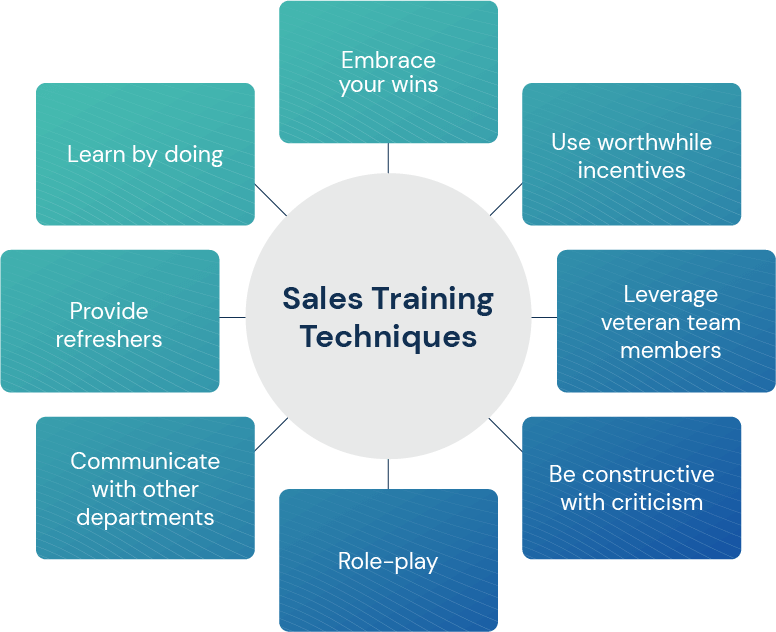
How To Measure Sales Training Success
Sales training programs are a great way to improve the skills of your team, but how can you be sure that they’re actually effective?
There are a few different ways to measure sales training success. One of the most common methods is the Kirkpatrick Model, which has four levels:
Level 1: Reaction
This level measures how participants react to the training. Did they enjoy it? Were they engaged? Did they find it helpful? Getting feedback at this stage can help you improve the content and delivery of future training programs.
Level 2: Learning
This level assesses whether participants actually learned the material presented in the training. This can be done through quizzes, tests, or other assessments. If participants aren’t able to demonstrate what they’ve learned, the training likely wasn’t effective.
Level 3: Behavior
This level looks at whether participants are using what they learned in the training in their day-to-day work. This can be done through observations, interviews, or surveys. If you see that participants aren’t using the knowledge and skills they learned in the training, you can then take steps to address the issue.
Level 4: Results
This level measures the impact of the training on your business goals. Did sales increase? Did customer satisfaction improve? Did costs decrease? By looking at results, you can get a clear picture of whether your sales training program is truly effective.
The Kirkpatrick Model is a helpful way of measuring the success of sales training programs. By using this method, businesses can ensure that their sales training is having the desired effect and positively impacting their bottom line.
When it comes to sales training, it’s important to set clear goals and objectives. Doing so will help you determine whether your sales training program is truly successful. Without measurable goals, it will be difficult to tell if your sales training is making a difference.
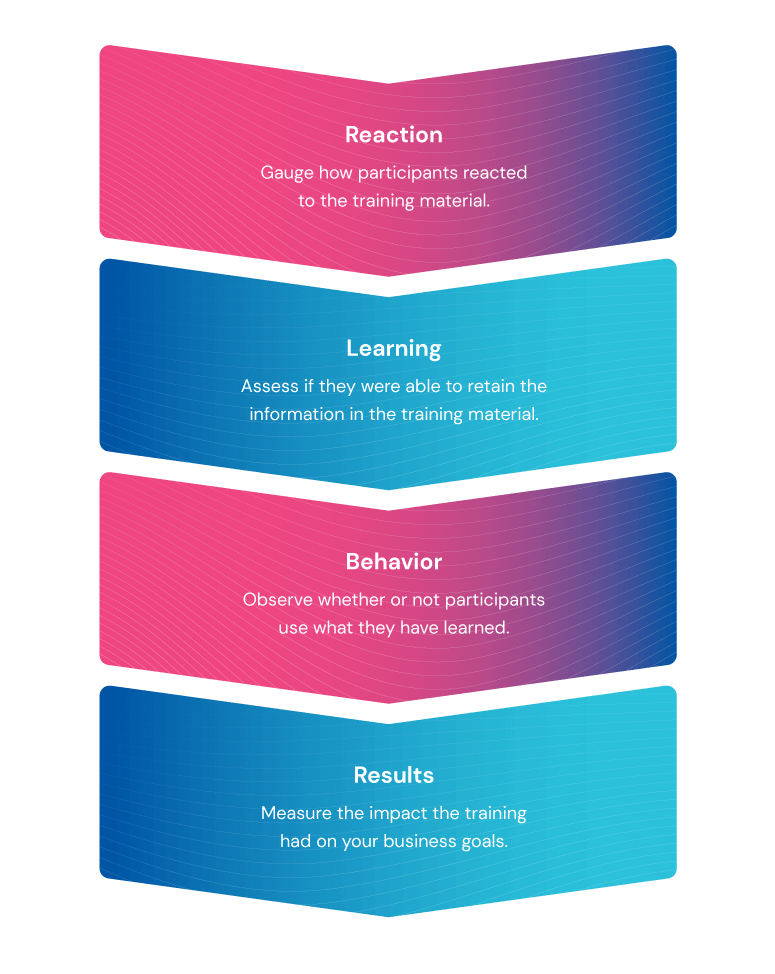
Sales Training Program FAQs
Sales training is a complex topic. Here are some frequently asked questions about sales training.
What Should a Sales Training Program Include?
A successful sales training program should focus on teaching salespeople how to address their customers’ needs. It should also cover essential topics like product knowledge, the sales process, and objection handling.
How Can I Develop a Successful Sales Training Program?
Developing a successful sales training program requires clearly defined goals and objectives and a curriculum that is aligned with your company’s sales process. Conduct regular assessments to gauge the effectiveness of the program so you can make adjustments along the way.
How can I Improve My Sales Skills?
The fastest way to improve sales skills is to study successful salespeople and learn from their techniques, and then put those skills to the test. Role-playing is a particularly effective method of practicing sales skills, though nothing can compare to the real thing.
What Are Some Common Mistakes Made in Sales?
Two common mistakes many salespeople make are not knowing their product well enough and talking too much. Product knowledge should be a top priority for sales training programs, and a little active listening training can go a long way in helping salespeople make potential customers feel at ease.
Invigorate Your Sales Team With Training That Works
Sales training is a great way to set your sales team up for success. It has a high return on investment and can help retention, build confidence, and increase morale.
Picking a sales training program can be tough, but hopefully this list made your decision a little easier. Remember that no matter what your industry may be, cold emailing can help improve sales.
Check out the Mailshake Cold Email Academy to learn more about how to set up a winning cold email strategy!


